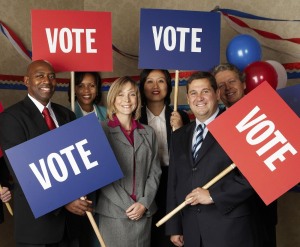The following blog post was written by Vishali Gandhi, LWVNJ summer intern.
The United States government, both at the federal and state level, is divided into three distinct and separate branches: the executive, the legislative, and the judiciary. The legislature passes laws, the executive enforces them, and the judiciary resolves disputes with the law. The legislative branch is comprised of the U.S. Congress on the federal level and the N.J. State Legislature on the state level. Both bodies are bicameral, meaning that they are split into two “houses”. Congress is divided into the House of Representatives and the Senate and the N.J. legislature is divided into the General Assembly and the Senate. They are similar in structure and they have almost identical procedures for passing bills.
The legislative process can be incredibly daunting, to say the least. The passage of each bill is a laborious (and often long) process that starts with the conception of an idea and can end in either passage and enactment or failure.
The first step in the process is the introduction of a bill onto the floor of the legislature. Bills can only be introduced by members of the legislature; however bills can often be inspired by concerns from constituents or interest groups (so contact your representative!). Once the bill has been drafted, it is assigned a name, which is read aloud on the floor of the legislature (this is referred to as the “first reading”). The member who introduced the bill is called the “sponsor”; if there are multiple members introducing and working on the bill, they are called the “co-sponsors”. Bills can be introduced in either house, both at the state and federal levels (except for federal money bills, which must originate in the U.S. House of Representatives).
After the bill has been introduced, it is sent to the appropriate committee for consideration. Congress and the N.J. Legislature each have their own sets of committees in both houses, each which deals with a particular area of legislation. A federal bill concerning the budget, for example, would be sent to the Ways and Means Committee in the House and the Appropriations Committee in the Senate. The committee considers the bill very carefully and often makes changes or amendments to bills (this process is called the “mark-up”). The committee can also decide to send the bill to a more specific subcommittee for further consideration and amendment. If the bill returns from the subcommittee, it can either be reported to the floor for a vote or it can be “tabled” (in effect, killing it).
If the committee decides to report out the bill, it is put on the legislative calendar and is presented on the floor of the legislature once more (known as the second reading). At this time, any legislator can offer amendments to the bill and the floor is opened to debate. In the U.S. Senate, the bill can be filibustered, which involves delaying or stopping the passage of a bill by debating it for an extraordinarily long period of time (the record for the longest filibuster belongs to Senator Strom Thurmond who filibustered the Civil Rights Act of 1957 for over 24 hours). The only way to end a filibuster is to invoke cloture, which requires a three-fifths majority to vote in favor of ending the debate period. Once the debate has concluded and all amendments have been discussed and voted on, a third reading of the bill occurs.
After the third reading, the bill is put to a vote. The entire house votes on the passage of the bill, and if a simple majority (50% plus 1) votes in favor, the bill passes and moves on to the next step. The bill can also be sent back to committee for further consideration. This process is the same in both the federal and state legislatures.
If the bill passes, it is sent to the other house for consideration, where it may pass, fail, or be amended. After the process is complete in the second house, a conference committee, comprised of members from both houses, is formed to resolve any differences between the two bills. They must be approved in identical forms by both the houses in order to move out of either the Congress of the N.J. State Legislature.
Once the bill has undergone its final passage through both houses, it is sent to the desk of the president or governor. There are several things that can happen to the bill at this point: it can be signed by the president or governor, it can be vetoed (the governor has the power of the line-item veto, which allows him or her to remove any part of a spending bill), or it can simply sit on his or her desk. If a bill sits on the governor’s desk for 45 days without any action, the bill automatically becomes law. If a bill sits on the president’s desk for 10 days (and if Congress is in session), the bill automatically becomes law. If the Congressional session ends during the 10 day period, the bill does not become law (this is called a pocket veto). If the bill is vetoed by either the president or the governor, the legislature can override it with a 2/3 vote; if there are not enough votes to override the veto, the bill is defeated. If the bill is signed (or the veto is overridden), it becomes law.







